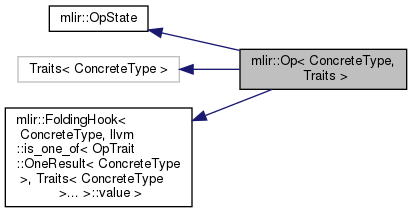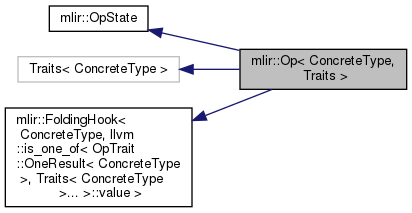#include <OpDefinition.h>


Public Types | |
| using | ConcreteOpType = ConcreteType |
 Public Types inherited from mlir::OpState Public Types inherited from mlir::OpState | |
| using | dialect_attr_iterator = Operation::dialect_attr_iterator |
| A utility iterator that filters out non-dialect attributes. More... | |
| using | dialect_attr_range = Operation::dialect_attr_range |
Public Member Functions | |
| Operation * | getOperation () |
| Return the operation that this refers to. More... | |
| ConcreteType | clone () |
| Create a deep copy of this operation. More... | |
| ConcreteType | cloneWithoutRegions () |
| Dialect * | getDialect () |
| Return the dialect that this refers to. More... | |
| Region * | getParentRegion () |
| Return the parent Region of this operation. More... | |
| Op () | |
| This is a public constructor. Any op can be initialized to null. More... | |
| Op (std::nullptr_t) | |
| Op (Operation *state) | |
| const void * | getAsOpaquePointer () const |
| Methods for supporting PointerLikeTypeTraits. More... | |
 Public Member Functions inherited from mlir::OpState Public Member Functions inherited from mlir::OpState | |
| operator bool () | |
| Ops are pointer-like, so we allow implicit conversion to bool. More... | |
| operator Operation * () const | |
| This implicitly converts to Operation*. More... | |
| Operation * | getOperation () |
| Return the operation that this refers to. More... | |
| Operation * | getParentOp () |
| template<typename OpTy > | |
| OpTy | getParentOfType () |
| Return the closest surrounding parent operation that is of type 'OpTy'. More... | |
| MLIRContext * | getContext () |
| Return the context this operation belongs to. More... | |
| void | print (raw_ostream &os, OpPrintingFlags flags=llvm::None) |
| Print the operation to the given stream. More... | |
| void | dump () |
| Dump this operation. More... | |
| Location | getLoc () |
| The source location the operation was defined or derived from. More... | |
| void | setLoc (Location loc) |
| ArrayRef< NamedAttribute > | getAttrs () |
| Return all of the attributes on this operation. More... | |
| dialect_attr_range | getDialectAttrs () |
| Return a range corresponding to the dialect attributes for this operation. More... | |
| dialect_attr_iterator | dialect_attr_begin () |
| dialect_attr_iterator | dialect_attr_end () |
| Attribute | getAttr (StringRef name) |
| Return an attribute with the specified name. More... | |
| template<typename AttrClass > | |
| AttrClass | getAttrOfType (StringRef name) |
| If the operation has an attribute of the specified type, return it. More... | |
| void | setAttr (Identifier name, Attribute value) |
| void | setAttr (StringRef name, Attribute value) |
| void | setAttrs (ArrayRef< NamedAttribute > attributes) |
| Set the attributes held by this operation. More... | |
| void | setAttrs (NamedAttributeList newAttrs) |
| template<typename DialectAttrs > | |
| void | setDialectAttrs (DialectAttrs &&attrs) |
| Set the dialect attributes for this operation, and preserve all dependent. More... | |
| NamedAttributeList::RemoveResult | removeAttr (Identifier name) |
| NamedAttributeList::RemoveResult | removeAttr (StringRef name) |
| bool | use_empty () |
| Return true if there are no users of any results of this operation. More... | |
| void | erase () |
| Remove this operation from its parent block and delete it. More... | |
| InFlightDiagnostic | emitOpError (const Twine &message={}) |
| InFlightDiagnostic | emitError (const Twine &message={}) |
| InFlightDiagnostic | emitWarning (const Twine &message={}) |
| InFlightDiagnostic | emitRemark (const Twine &message={}) |
| template<typename FnT , typename RetT = detail::walkResultType<FnT>> | |
| RetT | walk (FnT &&callback) |
 Public Member Functions inherited from mlir::FoldingHook< ConcreteType, llvm::is_one_of< OpTrait::OneResult< ConcreteType >, Traits< ConcreteType >... >::value > Public Member Functions inherited from mlir::FoldingHook< ConcreteType, llvm::is_one_of< OpTrait::OneResult< ConcreteType >, Traits< ConcreteType >... >::value > | |
| LogicalResult | fold (ArrayRef< Attribute > operands, SmallVectorImpl< OpFoldResult > &results) |
Static Public Member Functions | |
| template<template< typename T > class Trait> | |
| static constexpr bool | hasTrait () |
| Return if this operation contains the provided trait. More... | |
| static bool | classof (Operation *op) |
| Return true if this "op class" can match against the specified operation. More... | |
| static ParseResult | parseAssembly (OpAsmParser &parser, OperationState &result) |
| static void | printAssembly (Operation *op, OpAsmPrinter &p) |
| static LogicalResult | verifyInvariants (Operation *op) |
| static AbstractOperation::OperationProperties | getOperationProperties () |
| static ConcreteOpType | getFromOpaquePointer (const void *pointer) |
 Static Public Member Functions inherited from mlir::OpState Static Public Member Functions inherited from mlir::OpState | |
| static void | getCanonicalizationPatterns (OwningRewritePatternList &results, MLIRContext *context) |
 Static Public Member Functions inherited from mlir::FoldingHook< ConcreteType, llvm::is_one_of< OpTrait::OneResult< ConcreteType >, Traits< ConcreteType >... >::value > Static Public Member Functions inherited from mlir::FoldingHook< ConcreteType, llvm::is_one_of< OpTrait::OneResult< ConcreteType >, Traits< ConcreteType >... >::value > | |
| static LogicalResult | foldHook (Operation *op, ArrayRef< Attribute > operands, SmallVectorImpl< OpFoldResult > &results) |
Additional Inherited Members | |
 Protected Member Functions inherited from mlir::OpState Protected Member Functions inherited from mlir::OpState | |
| LogicalResult | verify () |
| void | print (OpAsmPrinter &p) |
| OpState (Operation *state) | |
 Static Protected Member Functions inherited from mlir::OpState Static Protected Member Functions inherited from mlir::OpState | |
| static ParseResult | parse (OpAsmParser &parser, OperationState &result) |
Detailed Description
template<typename ConcreteType, template< typename T > class... Traits>
class mlir::Op< ConcreteType, Traits >
This provides public APIs that all operations should have. The template argument 'ConcreteType' should be the concrete type by CRTP and the others are base classes by the policy pattern.
Member Typedef Documentation
◆ ConcreteOpType
| using mlir::Op< ConcreteType, Traits >::ConcreteOpType = ConcreteType |
Expose the type we are instantiated on to template machinery that may want to introspect traits on this operation.
Constructor & Destructor Documentation
◆ Op() [1/3]
|
inlineexplicit |
This is a public constructor. Any op can be initialized to null.
◆ Op() [2/3]
|
inline |
◆ Op() [3/3]
|
inlineexplicit |
This is a public constructor to enable access via the llvm::cast family of methods. This should not be used directly.
Member Function Documentation
◆ classof()
|
inlinestatic |
Return true if this "op class" can match against the specified operation.
◆ clone()
|
inline |
Create a deep copy of this operation.
◆ cloneWithoutRegions()
|
inline |
Create a partial copy of this operation without traversing into attached regions. The new operation will have the same number of regions as the original one, but they will be left empty.
◆ getAsOpaquePointer()
|
inline |
Methods for supporting PointerLikeTypeTraits.
◆ getDialect()
|
inline |
Return the dialect that this refers to.
◆ getFromOpaquePointer()
|
inlinestatic |
◆ getOperation()
|
inline |
Return the operation that this refers to.
◆ getOperationProperties()
|
inlinestatic |
◆ getParentRegion()
|
inline |
Return the parent Region of this operation.
◆ hasTrait()
|
inlinestatic |
Return if this operation contains the provided trait.
◆ parseAssembly()
|
inlinestatic |
This is the hook used by the AsmParser to parse the custom form of this op from an .mlir file. Op implementations should provide a parse method, which returns failure. On success, they should return fill in result with the fields to use.
◆ printAssembly()
|
inlinestatic |
This is the hook used by the AsmPrinter to emit this to the .mlir file. Op implementations should provide a print method.
◆ verifyInvariants()
|
inlinestatic |
This is the hook that checks whether or not this operation is well formed according to the invariants of its opcode. It delegates to the Traits for their policy implementations, and allows the user to specify their own verify() method.
On success this returns false; on failure it emits an error to the diagnostic subsystem and returns true.
The documentation for this class was generated from the following file:
- include/mlir/IR/OpDefinition.h
 1.8.13
1.8.13